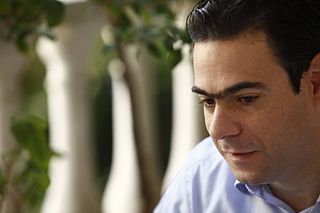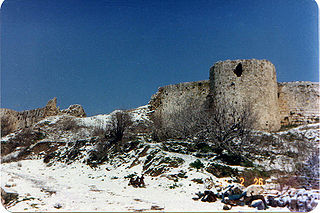
Lebanon, officially the Republic of Lebanon, is a country in the Levant region of West Asia. It is bordered by Syria to the north and east, by Israel to the south, and by the Mediterranean Sea to the west; Cyprus lies a short distance away from the country's coastline. Lebanon's location at the crossroads of the Mediterranean Basin and the Arabian hinterlands has contributed to the country's rich history and shaped a unique cultural identity shaped by religious diversity. Lebanon has a population of more than five million people and covers an area of 10,452 square kilometres (4,036 sq mi). Lebanon's capital and largest city is Beirut, followed by Tripoli and Jounieh. While Arabic is the official language, French is also recognized in a formal capacity; Lebanese Arabic is the country's vernacular, though French and English play a relatively significant role in everyday life, with Modern Standard Arabic being limited to news and government matters.

Michel Naim Aoun is a Lebanese politician and former military general who served as the President of Lebanon from 31 October 2016 until 30 October 2022.
Dory Chamoun is a Lebanese politician who led the National Liberal Party (NLP) from 25 May 1991 till 10 April 2021 when he was succeeded by his son Camille Dory Chamoun who became a MP in the 2022 Lebanese general election. He is also a prominent member of the Qornet Shehwan Gathering, a coalition of politicians, academics, and businessmen who oppose the pro-Syrian March 8 Alliance and Syrian influence in Lebanon. He is the eldest son of late Lebanese president Camille Chamoun and brother of Dany Chamoun.

The Future Movement is a Lebanese political party affiliated with the Sunni sect. The party was founded as a coalition in 1995 led by Rafic Hariri which was known as the Hariri Bloc but was officially founded in 2007. The party is led by Saad Hariri.

Adel Osseiran, also transliterated Adil 'Usayran or Adil Osseyran, was a prominent Lebanese statesman, a former Speaker of the Lebanese Parliament, and one of the founding fathers of the Lebanese Republic.

The State of Bahrain was the name of Bahrain from 1971 to 2002. On 15 August 1971, Bahrain declared independence and signed a new treaty of friendship with the United Kingdom. Bahrain joined the United Nations and the Arab League later in the year. The oil boom of the 1970s benefited Bahrain greatly, although the subsequent downturn hurt the economy. The country had already begun diversification of its economy and benefited further from Lebanese Civil War in the 1970s and 1980s, when Bahrain replaced Beirut as the Middle East's financial hub after Lebanon's large banking sector was driven out of the country by the war.

The 2006–2008 Lebanese protests were a series of political protests and sit-ins in Lebanon that began on 1 December 2006, led by groups that opposed the US and Saudi-backed government of Prime Minister Fouad Siniora and ended on 21 May 2008 with the signing of the Doha Agreement. The opposition was made up of Hezbollah, Amal, and the Free Patriotic Movement (FPM); a number of smaller parties were also involved, including the Marada party, the Lebanese Communist Party and the Syrian Social Nationalist Party. A majority of the members of the government were part of the anti-Syrian March 14 Alliance, a coalition of political parties and independents in Lebanon. The two groups were also divided along religious lines, with most Sunnis and Druze supporting the government, and most Shi'a supporting the opposition. The Christian community was split between the two factions, with Michel Aoun, the leader of the FPM, claiming to have more than 70% support among the Christians, based on the results of the 2005 parliamentary election.
The Council for Arab-British Understanding (Caabu) is a non-profit organization that is committed to promoting British Middle East policy based on international law, human rights, and civil society. Caabu has been active since its foundation in 1967, serving as an advocate, media and educational platform to shape UK foreign policy and public opinion.

Kamel Bey El-Assaad was a Lebanese politician and za'im.
International College is an independent non-profit international school in Beirut, Lebanon. Its students come from all over Lebanon, as well as the Middle-East and around the world. With two campuses, one in the Lebanese capital Beirut and the other in the urban hillsides, the school educates over 3,500 students each year. The school was established in 1891 and is chartered in Massachusetts, US.

Jbaa, is a town in Lebanon located about 22 km from Sidon and 64 km from Beirut. It is part of the Nabatieh Governorate. Jbaa is situated on the great Safi Mountain, and rises over 770 metres (2,530 ft) from the sea level and then begins to rise to 900 metres (3,000 ft) in the district of "Ein-Elsataoun". The village covers over 3,000 acres (12 km2). Surrounding the village is gorgeous greenery including diverse trees, especially walnut trees that spread around most of the town houses.

The Fraser government was the federal executive government of Australia led by Prime Minister Malcolm Fraser. It was made up of members of a Liberal–Country party coalition in the Australian Parliament from November 1975 to March 1983. Initially appointed as a caretaker government following the dismissal of the Whitlam government, Fraser won in a landslide at the resulting 1975 Australian federal election, and won substantial majorities at the subsequent 1977 and 1980 elections, before losing to the Bob Hawke–led Australian Labor Party in the 1983 election.

Nicolas Maurice Sehnaoui is a Lebanese politician and member of the Strong Lebanon bloc in the Lebanese parliament.

General elections were held in Lebanon on 6 May 2018. Although originally scheduled for 2013, the election was postponed three times in 2013, 2014 and 2017 for various reasons, including the security situation, the failure of the Parliament to elect a new President, and the technical requirements of holding an election. A new electoral law adopted in 2017 provides a proportional representation system for the first time.

Amel Association is a Lebanese, non-sectarian, non-profit non-governmental organization (NGO), created by Kamel Mohanna in 1979, in response to the Israeli invasion of 1978.
Laury Haytayan is a Lebanese oil and gas expert in the Middle East and North Africa. Since 2011, she has been leading the parliamentary capacity development portfolio at the Natural Resource Governance Institute (NRGI) in the MENA region, focusing on the legislative and oversight roles of Arab parliamentarians in advancing reforms in the Middle East Oil and Gas sector.
Sustainable Development Goals and Lebanon explains major contributions launched in Lebanon towards the advancement of the Sustainable Development Goals SDGs and the 2030 agenda.

El-Assaad or Al As'ad is an Arab feudal political family/clan originally from Najd and a main branch of the Anizah tribe. Unrelated to Syrian or Palestinian Al-Assads, El-Assaad dynasty that ruled most of South Lebanon for three centuries and whose lineage defended fellow denizens of history's Jabal Amel principality – today southern Lebanon – for 36 generations, Balqa in Jordan, Nablus in Palestine, and Homs in Syria governed by Ottoman rule between generations throughout the Arab caliphate by Sheikh al Mashayekh Nasif Al-Nassar ibn Al-Waeli, Ottoman conquest under Shbib Pasha El Assaad, Ali Bek El Assaad ruler of Belad Bechara, Ali Nassrat Bek. Advisor of the Court and a Superior in the Ministry of Foreign affairs in the Ottoman Empire, Moustafa Nassar Bek El Assaad Supreme Court President of Lebanon and colonial French administration by Hassib Bek—also supreme court Judge and grand speaker at halls across the Levant. El-Assaads are considered now "Bakaweit", and are considered princes or heirs to the family's dynasty to some.

General elections were held in Lebanon on 15 May 2022. The country has for several years been the subject of chronic political instability as well as a serious economic crisis aggravated by the 2020 explosions that hit the Port of Beirut and faced large-scale demonstrations against the political class.














